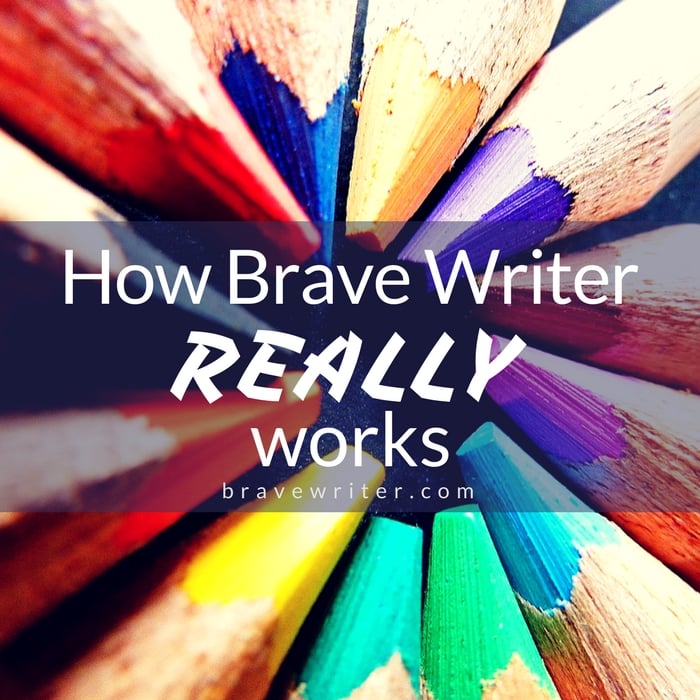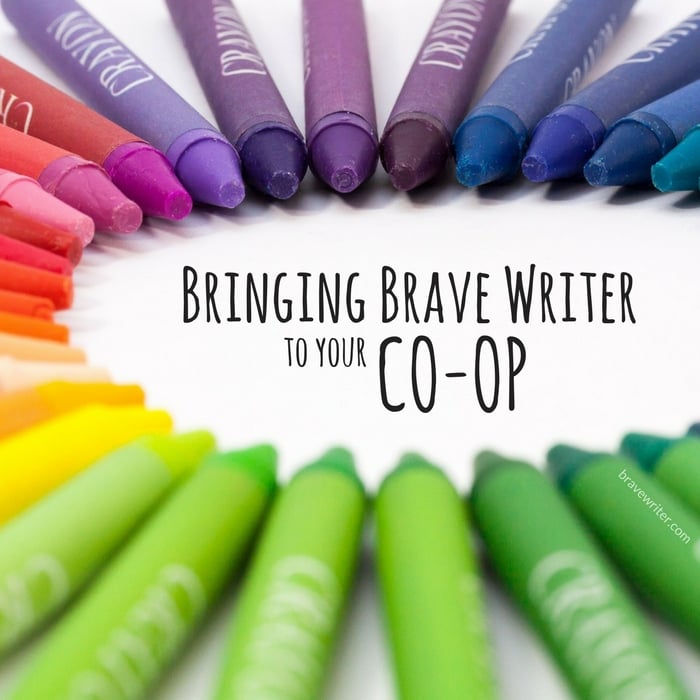
I get emails often asking how Brave Writer works. I sometimes get a little agitated by the question because I can’t just point to an outline of assignments and say: “Do these. They work.” I know many mothers hope to hear something like that.
I’ve devoted dozens of pages on the website and this blog to helping parents catch a vision for how it works. And I’ve tried to make it clear that Brave Writer is not just a bunch of writing techniques, but rather:
- a whole lifestyle
- a philosophy
…which undergird any and all writing and reading you do as a family.
This came home to me in two ways this week.
My son Jacob just started full-time high school. Leading up to the fateful day, he shared off-handedly in the car that he was looking forward to going to school because “we hadn’t done anything for three years” at home.
Excuse me? After I picked up my slain ego off the floor of the van, I reminded him of a few things he could “count” as school… He cares about me, so he listened sympathetically but perhaps unconvinced.
He returned from a long day “in the building” on that first day of classes exhausted. We peppered him with questions anyway.
He told us that in his English class, every book (save one) and most of the short stories the teacher had slated for the year, he’d already read. In fact, he was a bit miffed that they had assigned Lord of the Flies and he had not read it yet. He said, “Dad kept telling me to read that book and I haven’t yet. I’m so bugged at myself.” I reminded him he could read it over Christmas break, and he cheered up.
When the teacher asked the students who had seen a Shakespeare play, he raised his hand along with a few other students. Some had seen Romeo and Juliet. Jacob listed the plays he’s seen (about 20) and when he got to A Winter’s Tale and The Merry Wives of Windsor, the teacher shut him down chuckling saying that when they read Julius Caesar later that fall, they’d consult Jacob as the resident Shakespearean expert.
Then she assigned a freewrite on the first day of class and his comment to us was: “I used three huge vocabulary words in my freewrite just to play around. It was fun.”
In his geometry class, he got 100% on the algebra review quiz. In Spanish, he aced the first quiz as well. In science, he had already worked at home with a variety of measurement systems they introduced. In band, he’s playing saxophone as well as the rest of the section.
At the end of his recounting of the day, I chuckled:
“Jake, you were homeschooled. Get it now?”
He got this incredulous look on his face as the light dawned. “You mean, all those plays? All the freewriting? The books and stories I read? You mean that counts as homeschool? I did those because I like them, not for school.” “Yeah, I know.”
Somehow through his relationship with public school kids, he got to thinking that our lifestyle couldn’t “count” as school. He had not realized that our style of education was an education, and yet now, he discovered how prepared he is (not only prepared, but in many cases ahead). Yeah, satisfying for that recovering ego, I tell ya.
The second example of how the lifestyle works was posted on our forums about the steady growth of a dysgraphic/dyslexic son. Rachel’s son made loads of progress with his learning issues through the Brave Writer lifestyle as well as piano lessons. Her post is written to help other mothers wondering how to help their similar children. She writes:
One tip I would have about another dysgraphic child is to treat writing (and education) like most of us treat other developmental milestones. Julie so gets this!! I don’t believe that piano instruction is “the answer” for every child with dysgraphia by a long shot. It has worked for us because my son had an interest in music so he was plugged in and wanting to learn. That WILL (as Charlotte Mason called it) or desire to learn factor is *huge*!! Maybe your son is motivated by music too? That is what makes all the difference, I’m sure.
We started Brave Writer in the Jot It Down phase with him. 14. Yup. Jot It Down. That’s where he was when I looked at chapter 14 in The Writer’s Jungle [now Growing Brave Writers]. To my friends who have purchased The Writer’s Jungle I tell them to read that chapter first.
We more or less had to build up his idea of what writing is all about through Freewrites. He needed to want to write before we could go onto each of the the next steps. Next we incorporated Tuesday Teatimes. As the year went on we added a Boomerang subscription and copywork. Then dictation. That started one word at a time at first. I can’t believe it that I can now read whole sentences through, then once or twice more with natural phrasing and he gets it. We do pull our spelling words out of this and we do the grammar lessons that crop up from it too. Finally we’ve been doing the process pieces (these are freewrites taken through the revision phases). Three in the spring of last year and he’s working his way through a book review this month. (His choice…and not that easy for him to do!)
He types his answers. (We use a Dana by Alphasmart.) There is just no way for him to keep up with handwriting. He only prints and it’s nearly illegible still. That probably won’t change for him. If he someday wants to work on that I will support him in it. He’s just not ready for that. The school used to say that if we wanted good handwriting we could get it and nothing but it. It would take up all of his time and energy to do that one thing. So typing is what they were teaching him and it has been the right direction for us to follow.
If I can bore you further!! Here is how our Teatime went yesterday:
We had Teatime outside with iced tea, lemonade and animal crackers in the shapes of insects. I read from our “Nature Watch” book about what’s coming up in September all around us. The 13yo read “The Walrus and the Carpenter” from our poetry anthology. Our youngest shared poems from his latest issue of Ladybug magazine. Then this oldest son pulls out this poem that he wrote that morning to surprise us:
When a bright day meets a quiet night,
all of the animals on earth take flight.
To and from their nests they go,
in a hectic yet silent twilight show.
The bats take off and the birds touch down,
always around never touching the ground.
In a last yawn before bed
the sun spread
it’s colors wide,
and the moon will no longer hide.
One by one the stars do arrive,
to dance all night long was the goal to which they strive.
He did this poem without editing in one sitting. He says that he still wants to work on it. I can’t believe it. He actually *wants* to revise!
This is the Brave Writer Lifestyle for a child who struggles. Jacob’s life is an example for a kid who thrives and excels. (I have both kinds of kids in my five. In fact, I have one right now living the very same kind of BWL described above.)
Brave Writer is more than a book or a manual or a course.
It’s an approach to learning that creates momentum for your child through providing language related experiences one at a time over time, building on successes, taking advantage of interests and passions in the process. Writing is a part of that.
Writing is the written version of the mind life of your child.
You get to help him or her discover what is worth putting on that paper, and then how to manage it:
- revise it
- expand it
- clean it up
- shape it
Reading, viewing plays, seeing movies, drinking tea and reading poetry, having long conversations over dinner and in the car really are your homeschool now. They really do teach your children what they need to know.
Then when they show readiness, they can take that high school essay class and it won’t be intimidating.




















